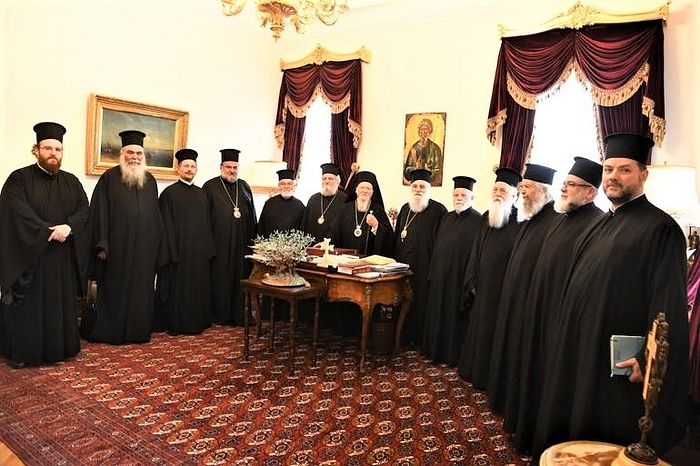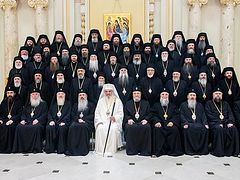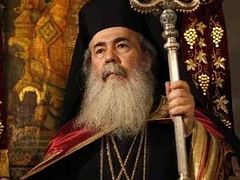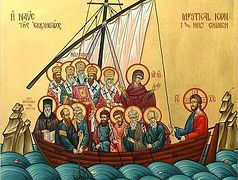Istanbul, February 17, 2020
Patriarch Bartholomew told the Jerusalem delegation that “discussions should have taken place beforehand and not afterwards.”
 Photo: jerusalem-patriarchate.info
Photo: jerusalem-patriarchate.info
Receiving a delegation from the Patriarchate of Jerusalem on Saturday, February 15, Patriarch Bartholomew of Constantinople again voiced his displeasure and his refusal to gather with his brother bishops in Amman, Jordan at the invitation of the Patriarch of Jerusalem.
The press service of the Patriarchate of Jerusalem reports that,
A high level delegation formally representing the Patriarchate of Jerusalem … [met] with His All Holiness Bartholomew, the Ecumenical Patriarch of Constantinople, to further explain the importance of the fraternal gathering scheduled to be held in Amman, Jordan later on this month with the participation of the vast majority of Orthodox Patriarchs and heads of Churches, to discuss global [O]rthodox unity and to enhance inter-[O]rthodox dialogue and reconciliation.
“The delegation assured H.A.H. the Ecumenical Patriarch Bartholomew,” who views his Church as the most important institution of the Greek race, “… that the Amman fraternal gathering does not constitute a formal Synaxis but rather a familial gathering of the Orthodox Primates for the purpose of dialogue.”
Jerusalem’s initiative is styled as a “fraternal gathering,” as Pat. Bartholomew has repeatedly announced that only he has the authority and right to gather the primates of the Local Churches. Several primates from the Greek world—Alexandria, Greece, Cyprus, and Albania—have also rejected Jerusalem’s invitation on the same basis.
According to the Jerusalem press service, the delegation personally delivered an invitation to Pat. Bartholomew from Pat. Theophilos to the Amman gathering and “pointed out [Pat. Theophilos’] sincerity in upholding the Holy Canons of the Church and respecting H.A.H the Ecumenical Patriarch’s acknowledged seniority.”
Nevertheless, Pat. Bartholomew still refuses to attend, saying the Patriarch of Jerusalem was not authorized to invite his brother primates and hierarchs to gather together for the sake of Church unity.
According to the State Department-funded site Orthodox Times, the hierarchs of Constantinople who were present at the meeting characterized the representatives of Jerusalem, Metropolitans Isychios of Capitolias, Timothy of Bostra, Exarch of the Holy Sepulchre in Cyprus, and Archbishop Nektarios of Anthedon, Commissioner of the Sepulchre in Constantinople, as unsure of themselves and their Patriarchate’s position.
Pat. Bartholomew also told the Jerusalem hierarchs that the stance of their Patriarchate would jeopardize the unity of the Orthodox world, “for which the Ecumenical Patriarchate” strives.
In Pat. Bartholomew’s view, “discussions should have taken place beforehand and not afterwards,” which echoes the argument that the other Local Churches have addressed to Constantinople, saying there should have been a pan-Orthodox discussion on the granting of autocephaly to the Ukrainian schismatics beforehand, not afterwards.
One of the hierarchs of Constantinople also threatened the Patriarchate of Jerusalem with the idea that Russian expansionism would eventually take aim at the holy sites in Jerusalem.
In November, Met. Timothy of Bostra called on all the invited primates to “renounce their interests and privileges of origin” and humble themselves and accept Pat. Theophilos’ invitation.
“Alexandria, Antioch, and Jerusalem are not the first to meet in the Holy City on matters of great importance to the Church! After the Ferraro-Florentine meeting, the three Patriarchs met in Jerusalem and condemned the signing of the Union,” Met. Timothy noted at the time.
The Patriarchate of Constantinople fell into heresy at the Council, capitulating to Catholic heresies, such as the notion of the Pope of Rome as the head of the entire Church.
See the article, “The Council of Jerusalem of 1443” at Orthodox Synaxis for more information on the Synaxis of Primates that was not called by Constantinople.
In an article published on Romfea last month, Greek theologian Nicholas Mann noted that the Patriarch of Jerusalem has initiated many such councils and gatherings over the centuries, the most notable being the Council of Jerusalem of 1672, which was declared to be a “Holy and Great Council” in the Encyclical produced at Patriarch Bartholomew’s Crete Council in 2016.
As of publication, 6 Churches have announced their intention to attend the fraternal gathering, and 5 have announced that they will not attend.




